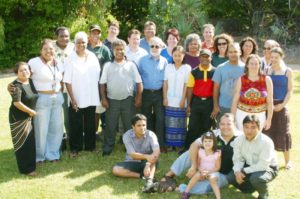CCB key to good settlement outcomes for migrants, refugees
Community capacity building – or helping communities to develop, implement and sustain their own solutions to problems – can be key to achieving better settlement outcomes for migrants and refugees, news research suggests.
In an article written by the Australian Institute of International Affairs, researcher Vivian Rivera claims that promoting community capacity building (CCB) can be an effective approach towards the growing issue of migrants and refugee’s social inclusion.
Research has shown that social inclusion has become a growing issue due to substantial population flows across and between societies.
 Ms Rivera, of the University of South Australia states that “employment is the cornerstone of successful social inclusion.”
Ms Rivera, of the University of South Australia states that “employment is the cornerstone of successful social inclusion.”
However, new comers are often faced with limited employment opportunities due to their lack of relevant experience, language and cultural barriers.
Refugee and migrant tensions are caused by “financial uncertainty and economic dependence.”
In her article, Ms Rivera lays out four policies to address these issues: the establishment of work placement programs; networking frameworks; cultural barriers training modules; and, integrated vocational education.
She proposes the promotion of work placement programs to ensure migrants and refugees have higher credentials in the decisive role of an employment selection process.
Offering flexible and temporary paid employment opportunities will assist them in gaining relevant local work experience, build job readiness and allow newcomers to feel as if they are productive, independent and contributing members of society, she says.
And that social networking ensures new comers have increased confidence, leadership skills entails a sense of community cooperation and belonging.
Ms Rivera emphasises that CCB aims to establish a comprehensive networking framework program facilitating the involvement of refugees and migrants in social events organized by local companies.
“This will maximize migrant and refugee opportunities to access the local job market, meet a diverse range of potential employers and secure a job,” she states.
“Refugee and migrants limited exposure to the host countries local workplace reflects the necessity to implement training modules that bridge cultural barriers in the workforce.”
Ms Rivera highlights that CCB aims to develop trust, connectedness and cooperation through positive socialism by establishing cross cultural modules and fostering a culturally diverse environment in the workplace.
She points out that by incorporating such values, refugees and migrants will have a realistic understanding of their host country’s work place culture maximizing their potential to effectively contribute to the economic focus of society.
New comers are often discouraged by their lack of recognizable work experience, limited language fluency and cultural barriers, the article claims.
To overcome this, CCB aims to implement formal immigration vocational training programs for adults at a low cost/no cost advancing their skills and preparing them for future employment in the host country, it says.
Vocational education programs combining language assistance, cross cultural training and social/economic guidance will positively enhance refugee and migrant’s employability and career prospects.
This will foster a feeling of self-reliance, self-determination, economic independence and productivity assisting in their social inclusion, Ms Rivera conveys.
Community Capacity Building is a vital element in ensuring better outcomes for migrants and refugees by promoting new comers assimilation into the broader community, she highlights.
The establishment of work placement programs, networking frameworks, cultural barriers training modules and integrated vocational education will allow migrants and refugees sense belonging and connectedness due to being able to collaboratively impact their new society.
Magy Mekhaiel












